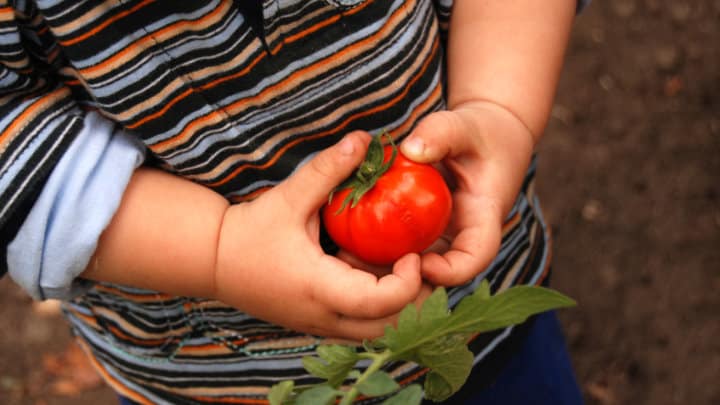
Jesus spoke often in parables and metaphors, using imagery of things known to explain things that were harder to understand. We can certainly use that example in teaching young students, using simple things to remind them of important truths. In this lesson, fruit is the main object. We will use real samples to discuss the fruits of the spirit and to compare faith to fruit and seed-planting.
Materials: Various fruits to taste and observe (apples, oranges, pears, lemons, etc.); other parts of the fruit, especially seeds; cheerios; paper lunch bags; fruit cut-outs or stickers; Bibles.
Verses: Galatians 5:22-23; Galatians 6:7-10
Open: Where did it come from? Show students seeds from various fruits: oranges, lemons, apples, etc…line up possible “parent” matches for the seeds and have students guess which fruit each seed came from…look at and discuss the fruits. This may be a good opportunity to talk about what exactly a seed is, and how all fruits begin as seeds. Explain to kids that we are going to talk about a different kind of “fruit” today…
Bible lesson: Discuss the fruits of the spirit and how they can be a blessing to our lives…for younger students, this can be a very basic talk about what each part means:
- Love: we love our families, our friends, our pets, and sometimes even things we shouldn’t love! More importantly, though, God loves us and cares for us. He “plants” us and guards us to help us “grow” in Him.
- Joy: This is more than just wearing a happy face. Joy means peace and thankfulness.
- Peace: This means calm, and can also talk about making peace with others.
- Patience: patience is being able to wait for things and trust that God will take care of you.
- Kindness: When we are kind to others, we treat them with love and respect, like we would want them to treat us.
- Goodness: How do we know what is good? It’s what God tells us to do! Read His Word the Bible to know best how to act.
- Faithfulness: This means sticking to your word and following God.
- Gentleness: Being gentle means not only acting with care but thinking before we act.
- Self-control: Before every action, it is important to pray and think properly.
While you are discussing, you might also hold up or draw (white board, etc.) pictures demonstrating some of these things (heart, smiley face, etc.).
For older students, you can also discuss each element, but delve into further detail as you come up with examples of how you might demonstrate each element. What is a way to show gentleness? How might the Holy Spirit help with self-control? Talk about why these elements are important.
Also talk about how we can “grow” these fruits…the Bible reminds us that we reap what we sow…
Do not be deceived: God cannot be mocked. A man reaps what he sows.8 Whoever sows to please their flesh, from the flesh will reap destruction; whoever sows to please the Spirit, from the Spirit will reap eternal life. 9 Let us not become weary in doing good, for at the proper time we will reap a harvest if we do not give up. 10 Therefore, as we have opportunity, let us do good to all people, especially to those who belong to the family of believers. -Galatians 6:7-10
Hold up a cup of cheerios. Ask students what will happen if Cheerios are planted in the ground…will they grow into donuts?? What about paper…does that grow when planted? Explain that things grow from what is planted. If you plant apple seeds, you cannot expect to grow a blackberry bush! If you put flower seeds in the ground, will bananas grow? No! Things grow from what is planted. So how do we plant seeds that will grow fruits of the spirit??
Talk about how to “plant” these things…
- Prayer. Ask God to help you, through the Holy Spirit, practice these things
- Scripture. Read the Bible daily to understand more of what God tells you to do.
- Surround yourself with people and things that will keep your mind on God. Finally, brothers and sisters, whatever is true, whatever is noble, whatever is right, whatever is pure, whatever is lovely, whatever is admirable—if anything is excellent or praiseworthy—think about such things. (Philippians 4:8) We can’t expect to be in touch with the Holy Spirit if we are doing things we know we shouldn’t do. Focus on the right thing!
Also, emphasize that a plant needs to not only be planted in the ground, but also watered and given sunlight. We plant our “roots” in God, but we must also nourish our souls with Him to keep growing and produce these fruits for us and other people!
Craft: Provide students with paper bag “baskets” and fruit cut-outs. Older students may write the fruits of the spirit qualities, while teachers write for younger ones. Allow students to decorate the baskets with crayons, stickers, and other materials as desired. Place the fruits into the basket one by one and re-cap.
Close with prayer that God would allow the Holy Spirit to work in our lives. Then sample a tasty fruity treat!
Search our website for more ideas about “Fruit of the Spirit.” You can also browse our complete lesson series on Spiritual Fruit from Galatians 5:22-23.

The resources for The Fruit of the Spirit activities are a blessing for our younger students attending Vacation Bible School.